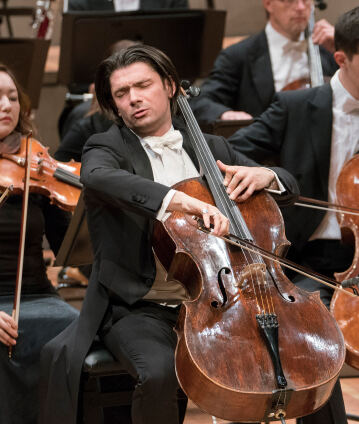Semyon Bychkov and Gautier Capuçon

Richard Strauss often came in for caustic criticism for his innovative music. He traces these conflicts in his tone poem Ein Heldenleben: biting, original, with an opulent orchestra sound. Dmitri Shostakovich’s battles in the dictatorship under Stalin were even more existential. Here too, there is an echo of this in the composer’s music, including in the First Cello Concerto – which can be heard here with Gautier Capuçon as the soloist. Semyon Bychkov conducts.
The lives of Dmitri Shostakovich and Richard Strauss developed as differently as two lives conceivably can. That makes it all the more exciting when in these two concerts Semyon Bychkov conducts the Berliner Philharmoniker in two works that appear to be musical self-disclosures on the part of the two composers. “Waiting for execution is one of the themes that has tortured me all my life”, Shostakovich is said to have confided to a friend towards the end of his life: “many pages of my music speak of that.” Such can also be found in the score of Shostakovich’s First Cello Concerto, composed in 1959. The work was composed after Shostakovich – previously ostracised by the Union of Soviet Composers for “anti-populist tendencies” – was awarded the Lenin Prize. The composer pinned little hope, however, on official rehabilitation as an artist: “The label ‘enemy of the people’ stuck to me forever,” Shostakovich recalled in later years: “My past was crossed out, my work, my abilities, turned out to be worthless to everyone. The future did not look any less bleak.” That Shostakovich’s First Cello Concerto, whose solo part – technically and emotionally equally tricky – is taken on in these concerts by the French cellist Gautier Capuçon, reflects on the composer’s existential life experiences and mortal fears is demonstrated not least by the work’s main motif, which is derived from Shostakovich’s musical monogram (D-(E)S-C-H – using the German note-naming conventions).
Richard Strauss was much more talented in manoeuvring through the political catastrophes of the 20th century and its aftermath – and coming out unscathed. For instance, the former president of the Reich Chamber of Music, no longer in favour with the Nazis, prevented the confiscation of his villa in Garmisch by US soldiers in 1945 by declaring: “I am the composer of the Rosenkavalier...” He had already created a musical monument for himself with Ein Heldenleben 46 years earlier. That’s because the principal players of this symphonic poem are the composer himself, his wife (according to Strauss “very complicated, a little perverse, a little frivolous ...”) and the guild of music critics, characterised by Strauss with biting humour. Two biographies, two musical self-disclosures – and two interpreters who are known for their uncompromising dedication to the works they play.
© 2017 Berlin Phil Media GmbH
Related interviews
Artists
Our recommendations
- Europakonzert 2012 from Vienna with Gustavo Dudamel and Gautier Capuçon
- Semyon Bychkov conducts Mahler’s Fourth and a new work by Larcher
- Semyon Bychkov conducts Richard Strauss’s “Alpine Symphony”
- Semyon Bychkov and Katia & Marielle Labèque
- Semyon Bychkov and Menahem Pressler
- Semyon Bychkov and Lisa Batiashvili perform Tchaikovsky’s Violin Concerto